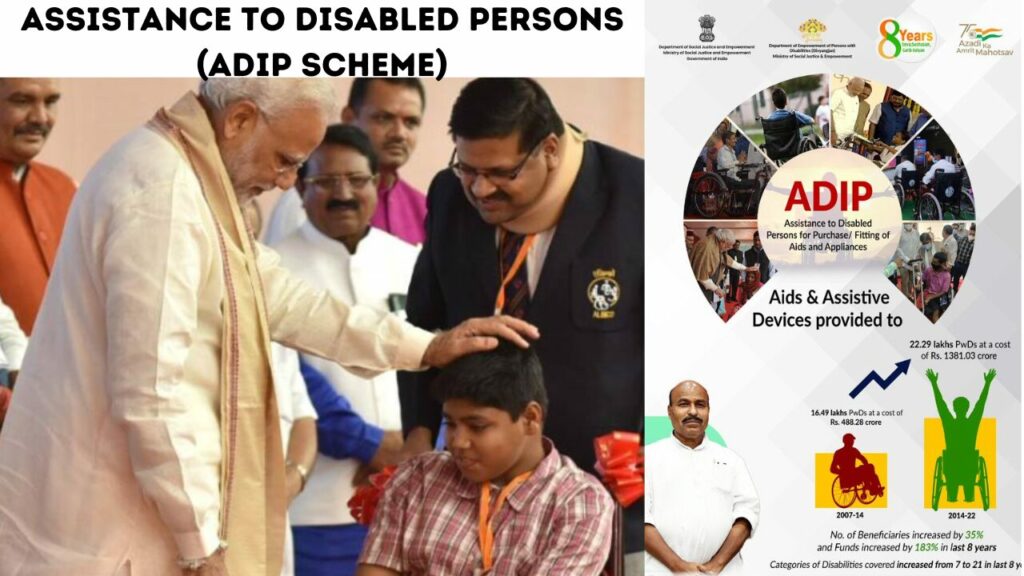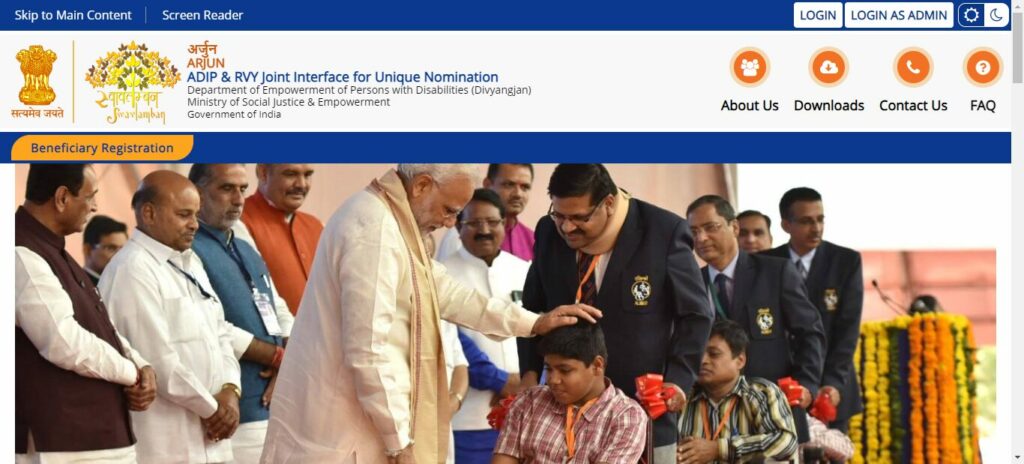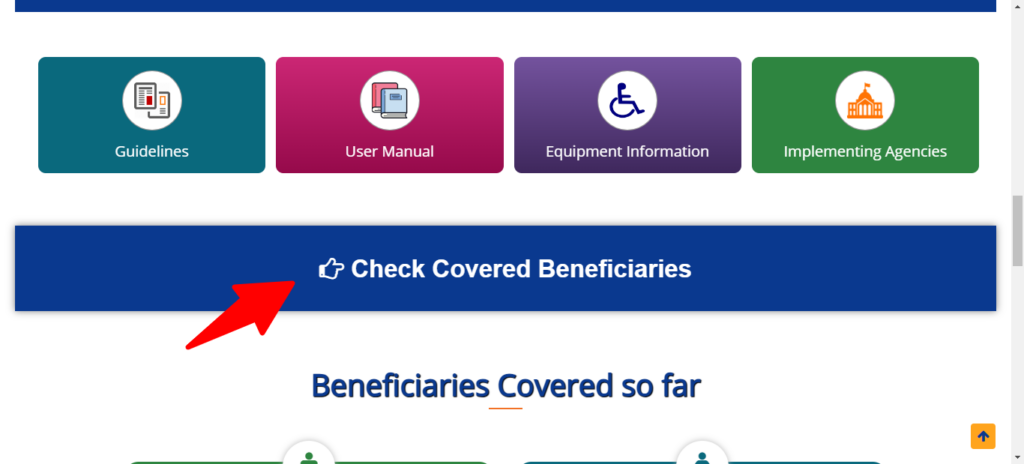About ADIP Scheme
The “ADIP Scheme” is a government program designed to help people with disabilities purchase sustainable, high-quality support and equipment that can help them with physical, social, and emotional rehabilitation. This program provides financial assistance to individuals eligible to purchase assistive devices, covers the cost of medical or surgical intervention, and provides maintenance and repair services for up to three years. The project aims to improve the quality of life of persons with disabilities and help them become more self-reliant.

Objective Of This Scheme
The ADIP Scheme aims to help persons with disabilities in various ways Tmain objectives of this schemes as follows
- To provide suitable, durable and modern Assistive Devices and Services to reduce the effects of disability.
- To support the physical, social and psychological rehabilitation of persons with disabilities.
- To help persons with disabilities increase their independent functioning and enhance their economic potential.
- To cover the cost of essential medical/surgical intervention for the fitment of aids and appliances.
- To prevent the extent of disability and occurrence of secondary disability.
- To improve the overall quality of life of persons with disabilities.
Eligibility Criteria
Eligibility Criteria for Beneficiaries:
- Must be an Indian citizen of any age.
- Should have a disability certificate with at least 40% disability.
- The monthly income of the beneficiary should not be more than Rs 30,000.
- In the case of dependents, the income of parents or guardians should not exceed Rs 30,000 per month.
- Should not have received any assistance for the same purpose from any source in the last 3 years, except for children below 12 years who must have received assistance for at least one year.
Benefits
The benefits provided under the Scheme for Assistance to Disabled Persons for Purchase/Fitting of Aids/Appliances (ADIP Scheme) are:
- Financial assistance is provided to persons with disabilities (PwDs) for purchasing/fitting aids and appliances as per the categories listed in the scheme.
- The quantum of assistance is as follows:
- Full financial assistance for aids/appliances costing up to Rs 15,000.
- Financial assistance up to Rs 15,000 for aids/appliances costing between Rs 15,001/- to Rs 30,000/-.
- For expensive items costing above Rs 30,001/-, the central government will bear 50% of the cost, subject to income ceiling and the remainder will be contributed by either the State Govt. or the NGO or any other agency or by the beneficiary concerned.
Cochlear Implant and post-operative therapy and rehabilitation for children with Hearing Impairment:
- Covered up to Rs 7.00 lakh per unit (to be borne by the Government) for children with pre-lingual hearing loss between 1 to 5 years of age.
- Covered up to Rs 6.00 lakh for children with acquired hearing loss between 5 to 18 years.
- Financial support covers the cost of the implant, surgery, therapy, mapping, travel, and pre-implant assessment.
Traveling costs:
If you need to travel to attend a rehabilitation center or distribution camp for AIDS and assistive devices, you can claim individual travel expenses for yourself and the person accompanying you. This includes rail or bus fares up to Rs 250 per person. You can claim this amount regardless of the amount you visit. It is important to attend a rehabilitation centre near your residence, except in the Northeast region, where you may be allowed to travel outside the region until such facilities are available within the Northeast region.
Boarding and lodging expenses:
The government provides a daily allowance of Rs100 for a maximum of 15 days for the cost of living and eating. This facility is applicable to patients with monthly income up to Rs 22,500 and their attendant/escort. This facility covers the following situations:
Attending camp for support and receiving assistive devices
People with locomotor disabilities who require corrective or reconstructive surgery or have to have an artificial limb/caliper fitted
People with hearing disabilities who need to stay for earmold fabrication/fitment
The implementing agencies will try to provide available boarding and accommodation facilities in dharamshalas connected to the hospital whenever possible.
Assistive devices for each type of disability:
a. For persons with locomotor disability:
- All prosthetic and orthotic devices, mobility aids, surgical foot wears, MCR chappals.
- All types of devices for ADL (activity of daily living) as recommended by an expert committee from time to time.
- High-end Prosthesis (Below Knee, Above Knee, Below elbow, and Above elbow) to Persons with disabilities having 80% and above disability. The extent of the subsidy would be Rs 30,000/-.
- Motorized tricycles and Motorized wheelchairs for persons with severe locomotor disability, Stroke, Cerebral Palsy, Hemiplegia, and any other person with similar conditions, where either three/four limbs or one-half of the body are severely impaired. Persons with Disabilities 80% and above disability would be eligible for assistance with a Motorized tricycle and a Motorized wheelchair. The extent of the subsidy would be Rs 50,000/-.
PERSONS WITH HEARING DISABILITY
- a. Various types of hearing aids, including BTE, etc.
- b. Educational kits.
- c. Assistive and Alarm devices.
- d. Any suitable aids & assistive devices as recommended by Expert Committee from time to time.
Persons With Intellectual and Developmental Disabilities
- a. Teaching and Learning Material (TLM) Kits.
- b. Multi Sensory Inclusive Education Development (MSIED) Kit.
- c. Any suitable device/kit/learning material as advised by Expert Committee from time to time.
MULTIPLE DISABILITY
Any suitable device as advised by Expert Committee from time to time.
LEPROSY CURED PERSONS
- i. Assistive Daily Living Kits (ADL) for Leprosy cured persons.
- ii. Any suitable device as advised by Expert Committee from time to time.
NEW DISABILITIES ADDED IN THE RIGHTS OF PERSONS WITH DISABILITIES RPWD ACT, 2016
Any suitable aids and assistive devices as may be specified by Expert Committee from time to time for new disabilities added in the PWD Act, 2016.
The implementing agencies will, as far as possible, avail the facilities of boarding and lodging available in the Dharamshalas attached to Hospitals.
Identification of Beneficiaries
- Through Camp Activity: Implementing agencies will carry out assessments of beneficiaries in camp mode at district levels.
- Through Headquarter Activity: The National Institutes/CRCs/ALIMCO/DDRCs and other implementing agencies will utilize the grants to extend services to eligible beneficiaries who approach their headquarters or their respective Regional Centres.
- Through Common Service Centres (CSCs): The Department will enter into an MOU with the CSCs functioning all over the country at Block, Taluka, and Gram Panchayat levels for registration of beneficiaries who need aids and assistive devices under the ADIP Scheme.
- Through Mobile App: A Mobile app will be launched by the Department to facilitate beneficiaries in getting aids and assistive devices. Beneficiaries can place requests for new assistive devices (new registrations) or repair existing devices (existing users) through the app.
- Through Management Information System (MIS)/ADIP Web Portal: The portal will facilitate PwDs for an online request for providing aids & assistive devices to eligible beneficiaries within 6 months from the date of registration on the Portal.
Required Documents
Here are the documents required by the beneficiary for availing benefits under the ADIP Scheme:
- Passport Size Photographs: The beneficiary needs to provide passport-size photographs as per the requirements of the implementing agency.
- Disability Certificate: The beneficiary needs to provide a copy of the disability certificate issued by a competent medical authority. The disability should be at least 40% as per the guidelines of the scheme.
- Address Proof: The beneficiary needs to provide a copy of any of the following documents as address proof – Aadhaar Card, Voter ID Card, Ration Card, etc.
- Income Certificate: The beneficiary needs to provide a copy of the income certificate as proof of income. The income from all sources should not exceed Rs. 30,000 per month.
- Undertaking: The beneficiary needs to provide an undertaking that he/she has not received the same aids & assistive devices from any source during the last three years. However, for children below 12 years of age, the minimum time of assistance is one year.
- Aadhaar Card: The beneficiary needs to provide a copy of the Aadhaar Card for identification and authentication purposes.
How To Apply
The application procedure for the ADIP scheme can be carried out offline or online.
Offline procedure:
- Through Camp Activity: Implementing agencies will conduct assessments of beneficiaries in camps at district levels, followed by distribution camps.
- Through Headquarter Activity: The National Institutes/CRCs/ALIMCO/DDRCs and other implementing agencies will utilize the grants to extend services to eligible beneficiaries who approach their headquarters or their respective Regional Centres.
Online procedure:
- Through Management Information System (MIS)/ADIP Web Portal: The portal will facilitate persons with disabilities to request aids and assistive devices online. Eligible beneficiaries will receive the devices within six months from the date of registration on the portal.
- Visit the ADIP MIS portal
- Click on the “Beneficiary registration” button on the homepage.
- Fill the necessary details and select the appropriate implementing agency from the list.
- Attach scanned copies of the required documents (mentioned below).
- Submit the application form.
- You will receive a confirmation message upon successful registration.

It is recommended to apply online through the UMANG mobile app or web portal, as it is a convenient and efficient way to apply for the ADIP Scheme. However, if an individual is not comfortable with the online application process, they can also apply through the Common Service Centers (CSCs) which are located in various parts of the country. The CSCs provide a range of government services to citizens, including assistance with the ADIP Scheme application process.
Check Your Application Status
- go to the official website of adip scheme
- now click on “check covered beneficiaries” link
- you’ll see several options to search for beneficiaries. These typically include:
- UDID: Enter the Unique Disability ID (UDID) of the beneficiary.
- UDID Enrollment No.: If you know the enrollment number associated with the UDID, enter it here.
- Aadhaar No.: If the beneficiary has an Aadhaar card, enter their Aadhaar number.
- Mobile No.: Enter the mobile phone number registered with the scheme for the beneficiary.
- Beneficiary Name: Enter the full name of the beneficiary
- now click on the submit button your application status will be shown
